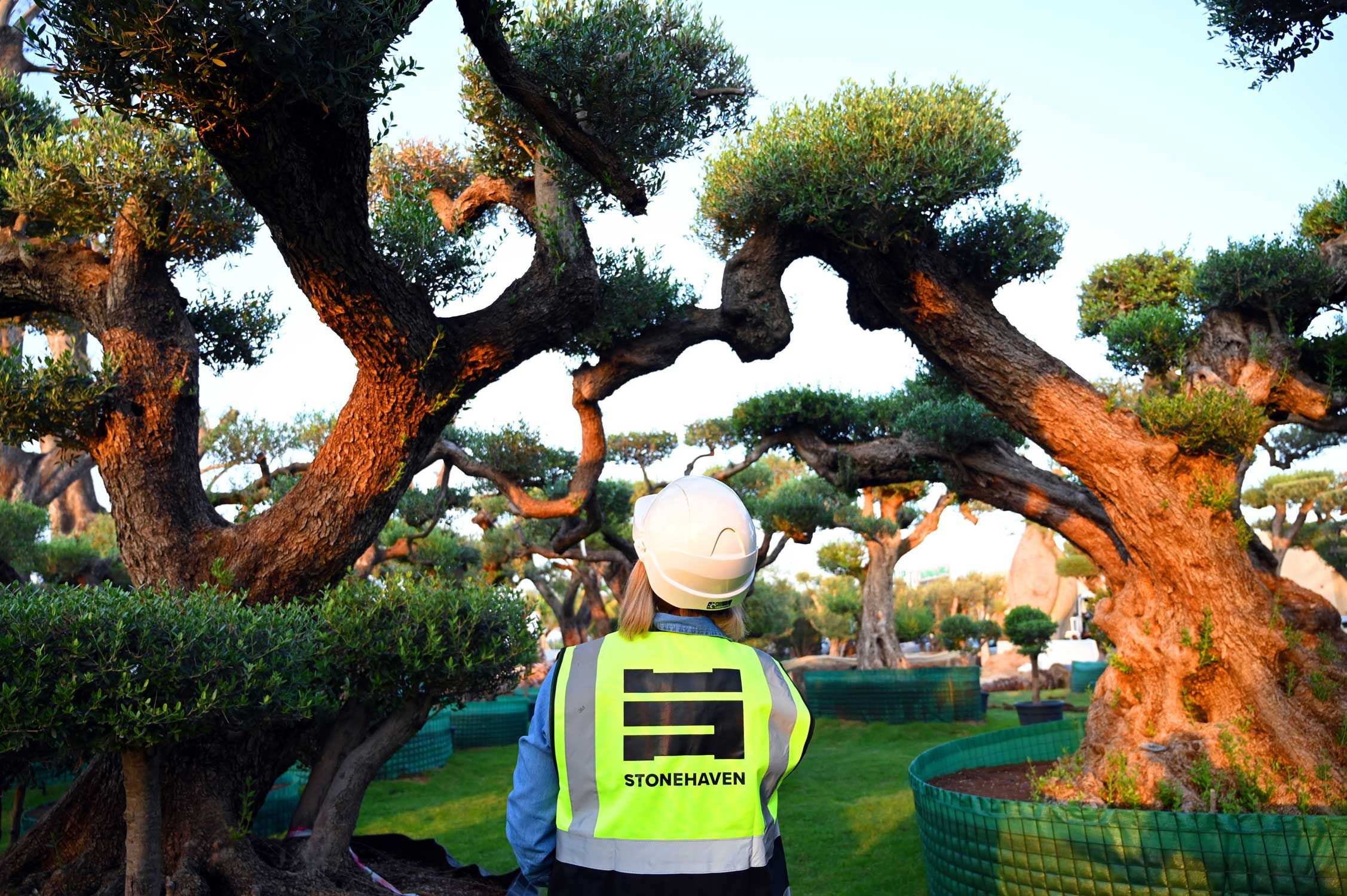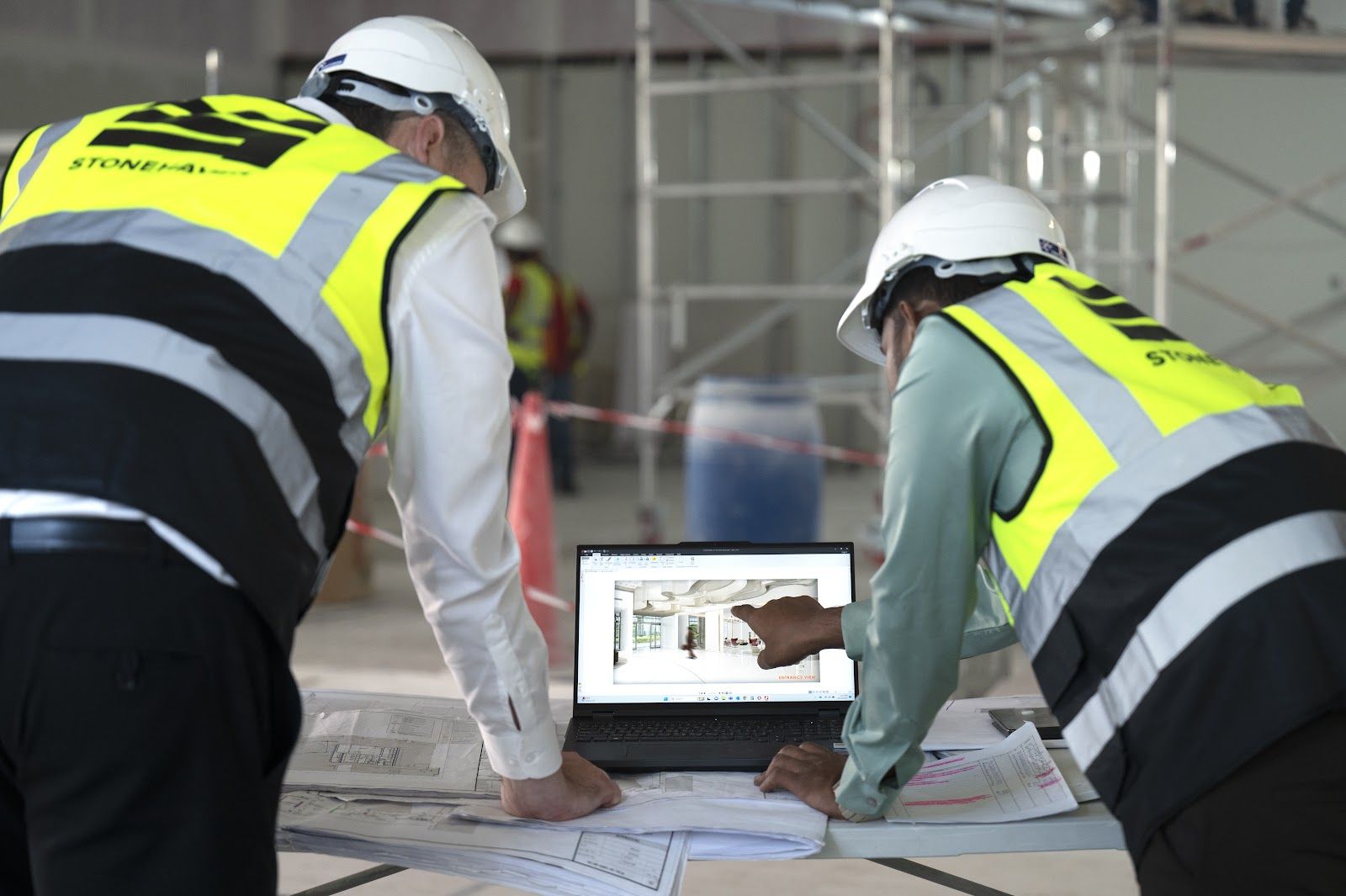In the construction sector, the execution of complicated undertakings calls for a systematic and deliberate approach towards the provision of contract administration services. Construction contract administration involves managing several elements which, when done effectively, determine the attainment of the project’s objectives in terms of costs, schedule, and quality.
This guide is intended to broaden the knowledge of construction contract administration by presenting what it involves in detail and elaborating on its advantages, major procedures, sector-specific issues and current developments. If you are a contractor, project manager, or developer, effective contract administration will change the approach you have towards construction tasks in a contemporary setting in high focus areas like the UAE.
What is Construction Contract Administration?
Construction contract administration involves managing contracts throughout a project’s lifecycle, ensuring all parties meet their obligations. This process includes everything from preparing contracts to overseeing deliverables, handling changes, disputes, and complying with legal standards. A contract administrator—often an experienced contract management consultant or team—plays a crucial role in maintaining project efficiency and alignment.
The framework of contract administration is integral to all types of construction projects, especially in the UAE, where adherence to standards is essential for maintaining transparency, legal compliance, and financial stability. For instance, McKinsey's analysis indicates that large projects across various asset classes typically take 20% longer to finish than scheduled and are up to 80% over budget. These overruns are often attributed to factors such as inadequate contract management and misaligned project objectives.
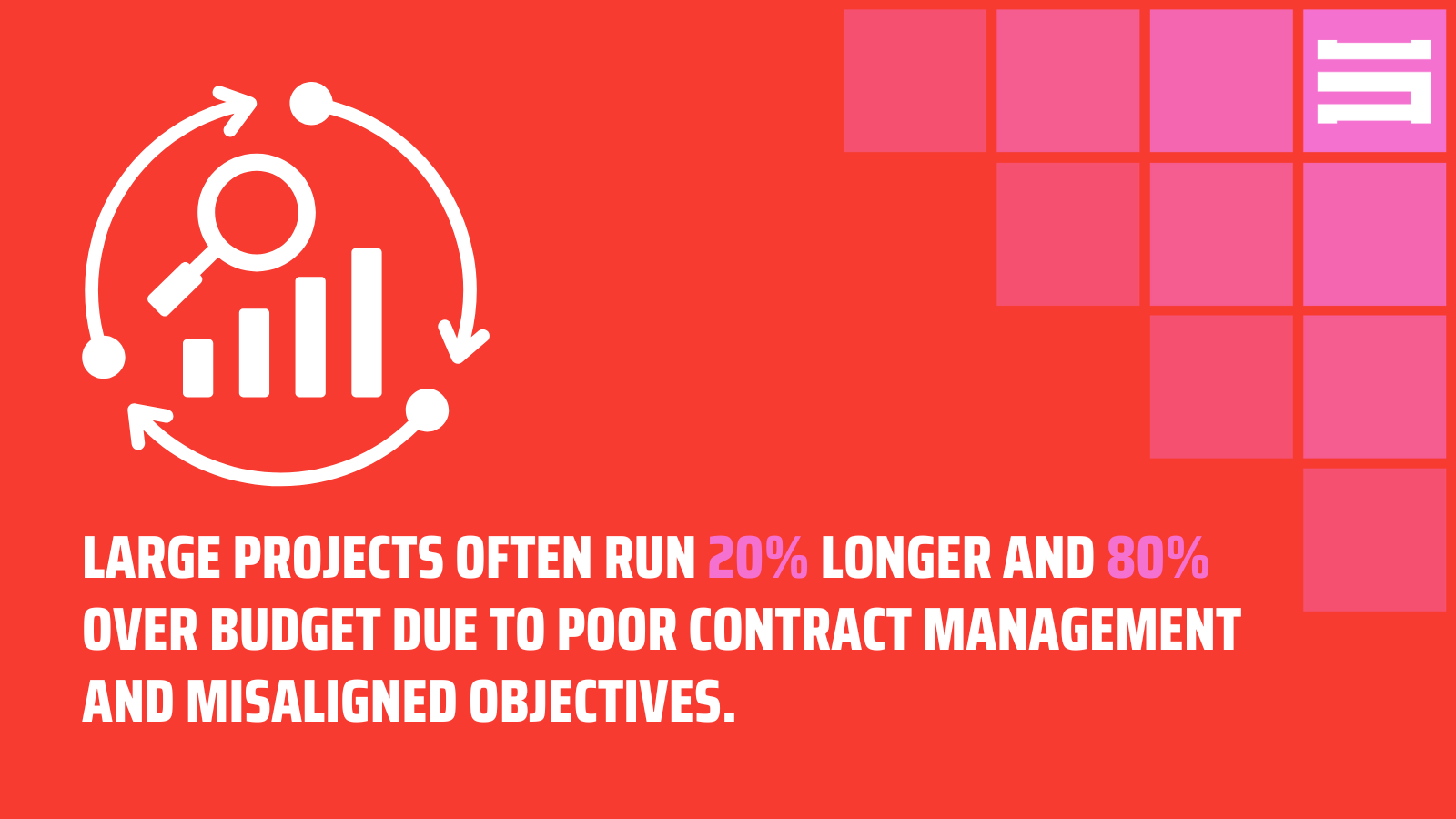
The Importance of Effective Construction Contract Administration
- Risk Mitigation: The implementation of contract administration services on a preventative basis assist in identifying and managing risks well in advance and therefore eliminates the chances of delays or costs overrun or disputes.
- Cost Control: Budgets have been set in projects and abiding by the terms and conditions of the contract assists in ensuring the costs do not go out of the project’s parameters, thus reducing the need for extra expenditures.
- Improved Coordination: To avoid misunderstanding, clients, contractors and regulators are provided with a password protected online messaging system and a website with all necessary information.
- Efficient Dispute Resolution: There is a procedure to enable settlement of disputes within a short period and this helps in minimising delays which can lead to the erosion of good relations between the parties to the project.
- Regulatory Compliance: In cases where the project location is in the UAE, legal requirements, compliance & safety precautions implementation are very important. With proper contract administration, all the stages of the project are properly controlled, and thus the chances of the project being fined or shut down are minimised.
What are the Approaches to Construction Contract Administration?
Successful contract administration relies on strategic planning, proper monitoring, and flexibility to adapt to the dynamic nature of construction projects. Here’s an in-depth look at the essential approaches that support effective construction contract administration.
1. Thorough Contract Preparation and Review
A well-drafted and comprehensive contract is the foundation of any successful construction project. This initial phase involves more than just signing a document; it’s about establishing a clear, enforceable framework that governs every aspect of the project. This preparation phase is led by contract administrators or contract management consultants, whose expertise ensures that each detail of the contract aligns with project objectives and complies with regulatory requirements.
- Defining Deliverables and Milestones: Clear deliverables and project milestones set the standards that every team member, from contractors to subcontractors and suppliers, will work towards. Defining these components at the outset reduces ambiguity and provides measurable goals that align with project timelines. A well-structured contract breaks down these goals into specific tasks, creating a roadmap that all stakeholders can follow. For example, in a large construction project, milestone definitions might include foundational work, structural completions, or inspection approvals. This specificity helps everyone involved know what is expected and when, minimising confusion and enhancing accountability.
- Compliance Standards and Quality Assurance: Given the regulatory complexities in the construction industry, especially in places like the UAE, setting compliance and quality standards from the beginning is essential. These standards address everything from safety requirements to environmental impact, aligning the project with local laws and industry best practices. Establishing compliance benchmarks also ensures that quality is maintained across all phases of the project. By clearly defining quality standards in the contract, the project team has a clear understanding of the materials, methodologies, and inspection protocols required, ultimately ensuring that the final deliverable meets the client’s expectations and regulatory requirements.
- Financial Clarity – Payment Terms and Penalties: Financial transparency is crucial in preventing misunderstandings or disputes. Documenting payment schedules, penalties for delays, and incentives for early completion ensures that everyone is aware of the financial terms. For example, if a project involves a series of phased payments based on milestones, defining these payments in the contract allows both parties to manage cash flow effectively. Clear financial terms also include penalty clauses for delays or quality issues, incentivising all parties to adhere to the agreed-upon timelines and standards. These clauses protect the client’s interests while giving contractors a fair framework for compensation.
2. Continuous Monitoring and Documentation
After a construction project commences, continuous monitoring and meticulous documentation are critical for ensuring that the project remains on track. This phase is an ongoing effort to observe and record progress, helping contract administrators make data-driven decisions and address potential issues before they escalate. Continuous monitoring encompasses every detail of the project, from budget tracking to milestone completion, creating a robust framework for accountability.
- Progress Tracking: Progress tracking involves monitoring each milestone, checking that all parties meet their contractual obligations and adhere to the agreed-upon timelines. Effective tracking requires breaking down the project into smaller, measurable steps, such as foundation work, electrical systems, and structural elements. By comparing actual progress against the contract’s timeline, administrators can spot any deviations early. For instance, if a particular phase lags schedule, contract administrators can implement corrective actions immediately. They might adjust workflows, allocate additional resources, or coordinate with subcontractors to accelerate progress. By tracking progress continuously, the project team can prevent minor delays from evolving into costly setbacks.
- Budget Oversight: Continuous budget monitoring ensures that costs remain within the scope defined in the contract management plan. Tracking expenses daily or weekly allows administrators to detect discrepancies between budgeted and actual spending, making it possible to adjust before any significant overruns occur. For example, if material costs suddenly increase, the contract administrator can assess the impact on the overall budget and propose reallocations or cost-saving measures. Budget oversight also includes evaluating resource allocation efficiency, ensuring that labour and materials are being used optimally and that the project remains financially viable.
- Change Documentation: Construction projects are dynamic, and scope changes are common due to design modifications, client requests, or unforeseen conditions on-site. Proper change documentation records each adjustment, outlining how it affects timelines, budgets, and contractual obligations. Documenting changes in real-time creates an accurate project record, reducing misunderstandings and preserving accountability. This process also provides a reference point if disputes arise regarding project modifications. For example, if a client requests an additional structural feature, documenting the change’s cost, labour requirements, and timeline impact ensures transparency and clarity for all parties.
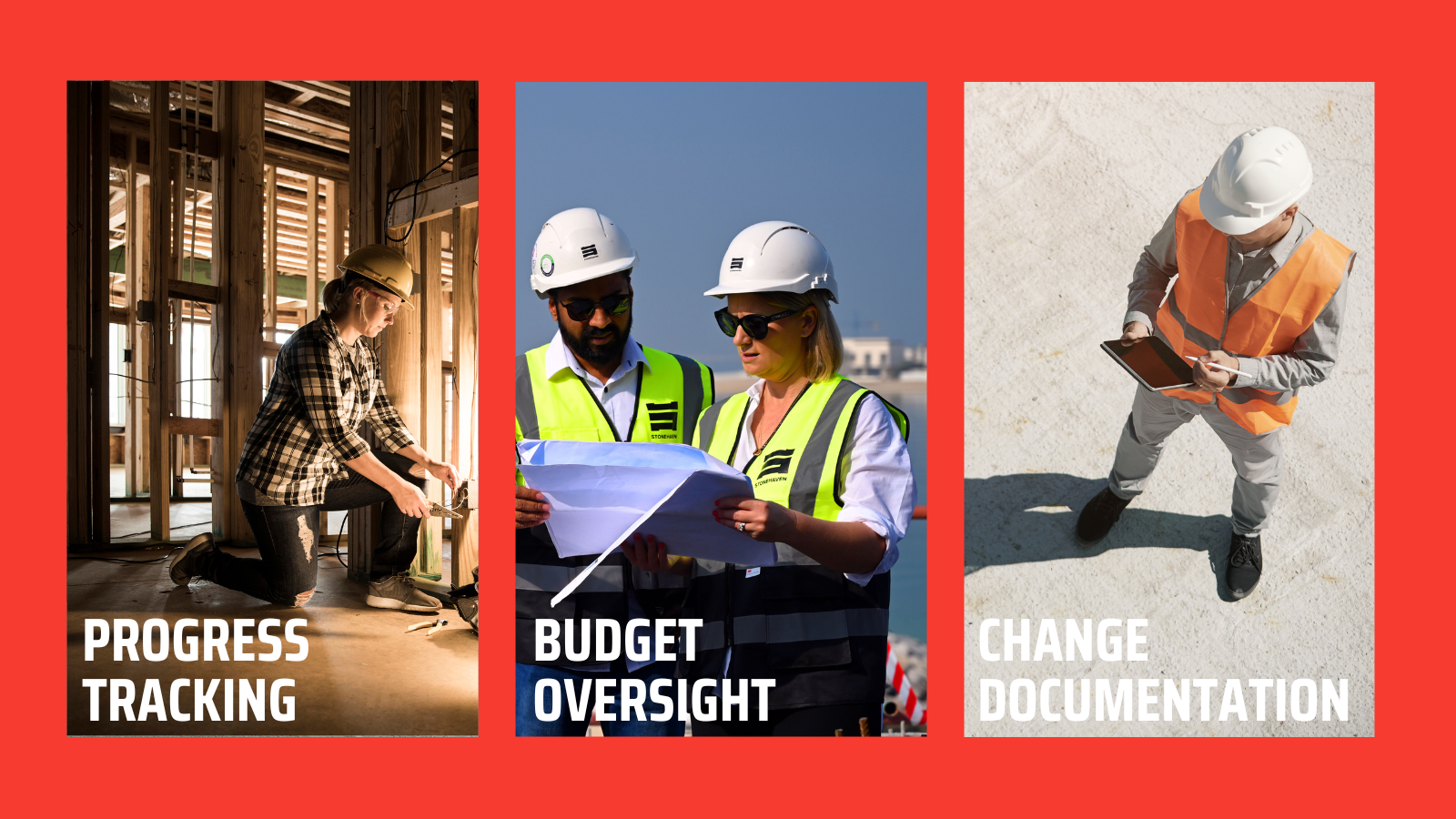
3. Proactive Change Management
In construction, scope changes are virtually inevitable. Change management, therefore, is an integral part of contract administration that involves planning, assessing, and implementing adjustments to the project without compromising quality, budgets, or timelines. A proactive approach to change management ensures that changes are evaluated thoroughly, communicated transparently, and implemented seamlessly, thus preserving the project’s integrity and stakeholder relationships.
- Formal Change Requests: A structured change request process helps stakeholders assess the feasibility of any proposed adjustments. Every change starts with a formal request, outlining what modifications are needed, why they are necessary, and their potential impact on the project. For instance, if a client requests a change in building materials due to aesthetic preferences, the change request will detail the cost implications, timeline adjustments, and any additional regulatory considerations. Formalising this process ensures that changes are not made haphazardly, protecting the project’s timeline with proactive project management and budget undertaken by cost managers.
- Cost and Timeline Impact Analysis: Each proposed change should undergo a comprehensive analysis to assess its effect on both the budget and schedule. This analysis helps determine whether the project can accommodate the modification without significant disruption. If the requested change is likely to cause delays or require additional funding, contract administrators can provide alternative solutions that minimise the impact. For instance, if a design change impacts the structural framework, administrators may suggest compensating adjustments in subsequent phases to keep the project on track. This proactive approach ensures that the project remains viable and within contractual obligations.
- Stakeholder Communication and Alignment: Effective change management requires clear communication between all stakeholders, including the client, contractors, subcontractors, and suppliers. Keeping everyone informed about changes, their impact, and the revised responsibilities prevents confusion and helps maintain alignment across the team. For instance, if a design modification requires additional inspections or approvals, ensuring that all parties understand the updated requirements and timelines prevents delays and errors. Communicating changes clearly and promptly fosters trust and transparency, ensuring that stakeholders remain aligned and committed to the revised project scope.
4. Dispute Resolution and Risk Management
Disputes in construction projects are common and can arise from various factors, including delays, quality concerns, and unexpected changes. Arcadis reported that in the Middle East, the average value of construction disputes increased from $62 million in 2019 to $86 million in 2020, highlighting the financial implications of such conflicts.
Effective dispute resolution and risk management are crucial components of contract administration, as they protect the project’s timeline, budget, and stakeholder relationships. A robust approach to handling disputes and mitigating risks prevents minor issues from escalating into major project setbacks.
- Establishing a Dispute Resolution Process: Defining a clear process for dispute resolution in the contract helps prevent misunderstandings and disagreements from derailing the project. The process should outline escalation steps, starting with informal discussions and moving to mediation, arbitration, or legal action if necessary. For example, a contract might specify that disputes over delays are first addressed through internal meetings, with unresolved issues moving to a neutral third-party mediator. Having a defined process ensures that all parties know how to handle conflicts constructively, keeping the project on track and preserving working relationships.
- Dedicated Contact for Conflict Resolution: Assigning a designated contact person for managing disputes helps resolve issues promptly. This individual, often a senior contract administrator or project manager, acts as a neutral mediator who facilitates communication between the involved parties. Having a central point of contact ensures that conflicts are addressed efficiently, reducing the risk of prolonged disputes that could impact the project timeline. For instance, if a contractor disputes payment terms, the assigned mediator can clarify the terms, review documentation, and work toward a fair resolution.
- Regular Risk Assessments: Risk management involves proactively identifying, assessing, and mitigating potential risks. Regular risk assessments are essential, as they help contract administrators spot vulnerabilities and implement protective measures. Risks in construction can include labour shortages, material delays, or regulatory challenges. By conducting these assessments at every project phase, administrators can allocate resources effectively, adjust project timelines, or source alternative materials, ensuring that the project remains resilient against potential setbacks.
What are the Challenges in Construction Contract Administration?
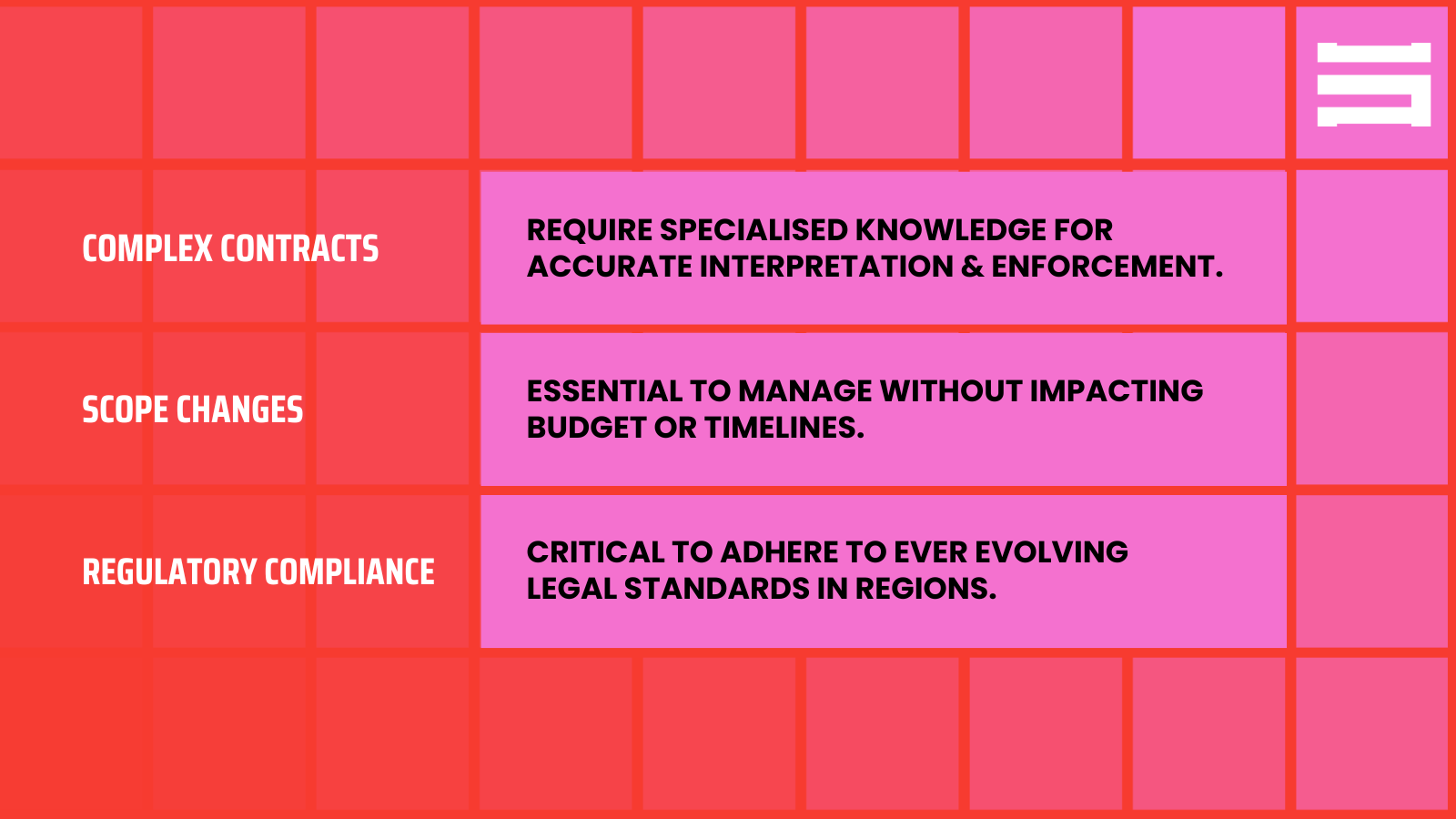
While contract administration is essential, it’s also challenging. Common issues include:
- Complex Contracts: Construction contracts require specialised knowledge for interpretation and enforcement due to their complexity.
- Scope Changes: Managing changes without impacting budget or timelines is essential yet challenging.
- Regulatory Compliance: Adhering to evolving legal standards is critical, especially in regions with strict regulations like the UAE.
What are the Opportunities in Construction Contract Administration?
- Technology-Driven Contract Lifecycle Management – CLM tools streamline contract processes, enabling real-time collaboration and automated alerts to keep projects on track.
- Data Analytics for Decision-Making – Analytics tools provide valuable insights into cost trends and risks, aiding in more informed decision-making.
- Sustainability Clauses in Contracts – Construction contracts increasingly include environmental clauses, promoting sustainability through waste reduction and energy efficiency.
- Rising Demand for Skilled Contract Administrators – Growing project complexity is driving demand for qualified administrators and quantity surveyors, with training programmes supporting skill development.
The future of construction contract administration looks promising as technology advances and projects continue to grow in scale. Technologies like AI and automation will improve real-time data analysis, document management, and risk prediction, making contract administration faster and more accurate. Skilled contract administrators who can adapt to these innovations while staying grounded in foundational principles of contract for project management services will remain essential in the construction industry.
Conclusion
In the dynamic field of construction, contract administration services are indispensable. From drafting the initial contract to wrapping up the project, solid contract administration keeps things on schedule, within budget, and fully compliant. By embracing best practices and staying on top of industry trends, construction professionals can make their contract administration processes smoother and achieve even better project outcomes.
As the industry advances, experienced contract management consultants—who offer expertise, clarity, and strategic insights at every project phase—will remain key players in driving construction success.
About us
Stonehaven is a trusted project management company and construction consultant based in Dubai, offering comprehensive construction management services across the UAE with offices located in Dubai, UK and Sri Lanka. As one of the leading project management companies in Dubai, we manage projects from inception to completion, ensuring quality, efficiency, and cost-effectiveness at every stage.
We deliver value through expert project management consultancy services, tailored to meet the unique needs of each client. Our core services include Cost Management, Project Management, Construction Supervision, Engineering Support, Design Support, and Marketing & Communications. Whether you’re looking for construction consultants or project managers in the UAE and wider GCC region, Stonehaven is your trusted partner for achieving excellence in your next project.
Stonehaven is your trusted partner for Construction Contract Administration Services & Management in the UAE. Our team of expert contract management consultants offers comprehensive solutions for contract lifecycle management, ensuring every phase of your project is efficiently managed and compliant with the highest standards. With our specialised knowledge in post-award contract management best practices and experience in construction projects of all scales, Stonehaven provides the support and expertise you need to achieve your project goals.
Contact us today to learn more about how Stonehaven can bring expertise and value to your next construction project.









